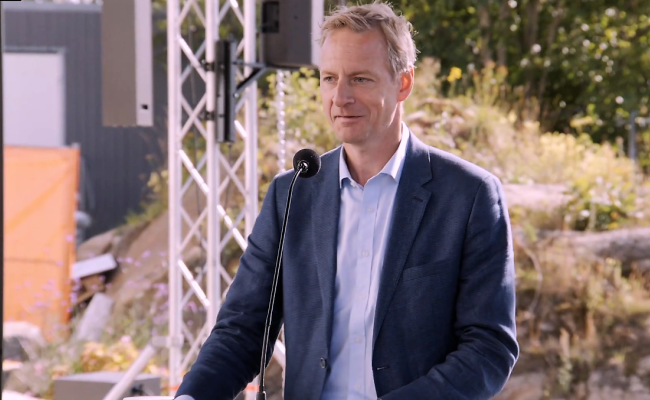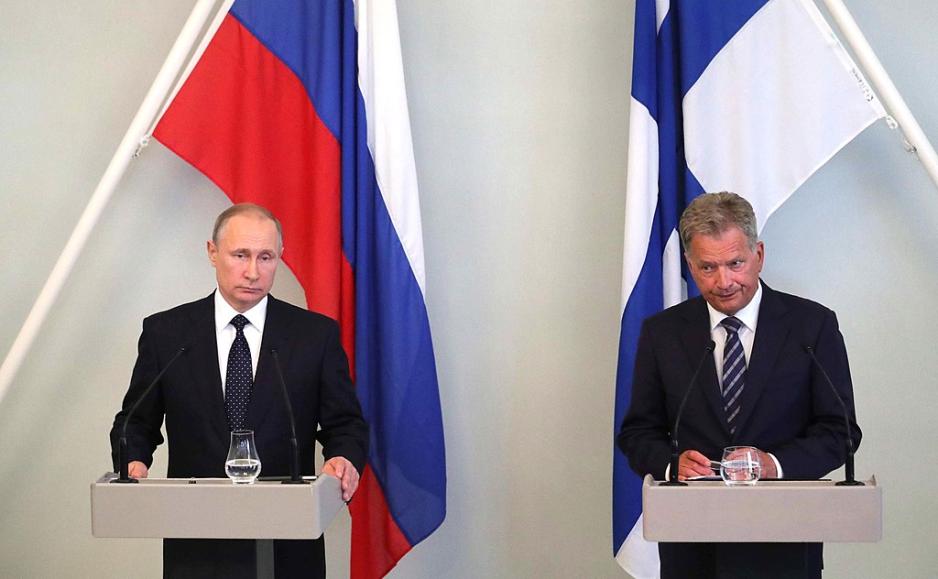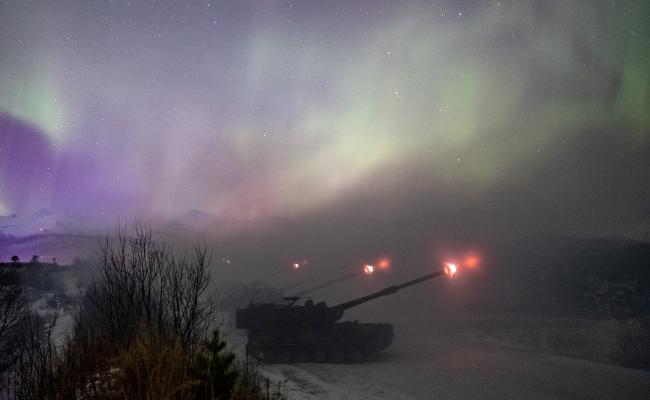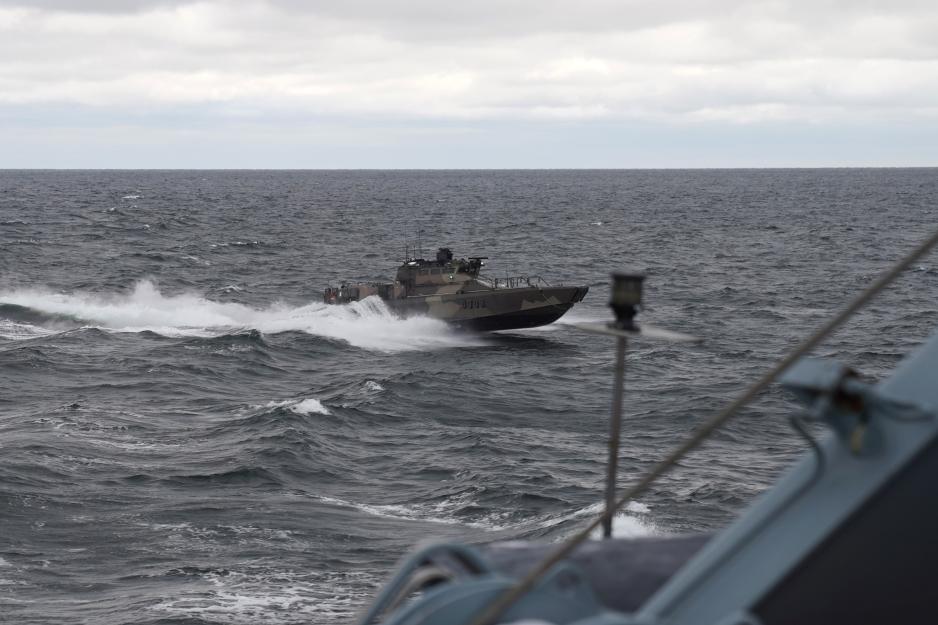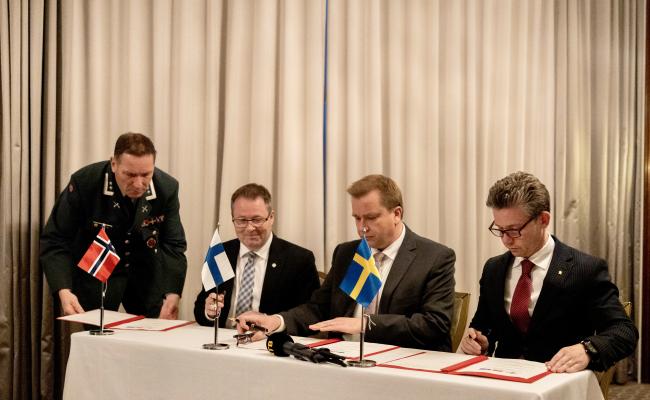Ambassador Teemu Tanner: Finland Can Learn A lot From How Norway Builds Its NATO Activities
It is the first time Finland's ambassador to Norway, Teemu Tanner, is so far north in Norway, and the aim is to meet both businesses and organizations and to gain some insight into life in the Norwegian Arctic. (Photo: Trine Jonassen)
"My starting point will be to prepare a NATO membership with Norway and figure out what it means for our future defense," says Finland's new ambassador in Norway, Teemu Tanner. He believes that Norway could be a good example for Finland as a NATO country to compare with.
In 1995, Finland went from being security policy neutral to alignment-free after becoming a member of the EU. But after the country they share a 1340 kilometer long border with invaded a sovereign state in February, Finland turned towards the alliance and entered NATO's open door.
The new Finnish Ambassador to Norway, Teemu Tanner, says in an interview with High North News that Finland had to keep up when the world suddenly changed.
High North News met the Finnish Ambassador during a trip to Northern Norway. It is the first time Tanner has been this far north in Norway and the aim is to meet businesses, and organizations, and gain some insight into the Norwegian Arctic.
"I would have loved to have seen more while I am here," sighs Tanner and looks out into the polar night.
Although it is early in the afternoon, it is pitch black outside.
I would say it has been a rather calm reaction.
Turbulent relationship
During the visit, the conversation naturally turns to Finland's NATO application, and the ambassador believes that his home country has a lot to learn from Norway and how it is to be part of NATO in the north when one borders Russia. But although Norway and Finland share many similarities, Finland has a more turbulent history with its powerful neighbor to the East
A history filled with unrest, war, and threats. But also cooperation and peaceful neighborliness between people. History has also taught the Finns that peace and good neighborliness is not something they should take for granted.
Russia already conquered Finland from 1808 to 1809 and made Finland a Russian Grand Duchy. But during the Russian Revolution of 1917, Finland declared itself independent.
However, Finland's mighty neighbor did not give up and in 1939, Finland found itself in a similar situation to what Ukraine experienced in February when the Soviet Union attacked and thus triggered the Winter War with the subsequent loss of Finnish territories. Territories that Finland tried to gain back during the Continuation War against the Soviet Union from 1941 to 1944.
The armistice agreement of September 1994 restored the borders of 1940. In addition, the Finns had to abstain from Petsamo and give the Soviet Union a military base in Porkala near Helsinki. Finland also had to pay war reparations to the Soviet Union.
Also read
In the post-war period, however, the relationship became better and the countries entered into a number of cooperation agreements. But after the fall of the Soviet Union, the friendship agreement was terminated.
Then followed the EU membership and now NATO. And Russia is once again rattling its sabers to express its disapproval, with threats of hybrid attacks and military and political consequences, among other things, which the Finns are apparently taking very calmly.
The ambassador explains that Russia's reaction to the NATO application is not very different to the Russia the Finns already know.
"This is the attitude Russia has adopted every time they have been asked what they think about Finnish NATO membership. I would say it has been a rather calm reaction."
Disturbing speech
Tanner remembers very well when the atmosphere changed in Finland.
"President Putin's December speech, where he questioned countries like Sweden and Finland's right to choose their own security in their own elections," says the Finnish Ambassador.
Putin's disturbing speech was followed by the Finnish President's New Year's speech, where he warned against the new security situation and emphasized that Finland had room for action and the possibility of military alliance through a NATO membership;
"In a fast-paced world, it is even more important to know to hurry and when to be patient," stated President Sauli Niinistö.
"Finland was already leaning towards NATO, but this was the tipping point. From there on, NATO membership became increasingly relevant. And it became important that the process was democratic so that everyone was involved in the decision-making. The plan was to have as much support as possible before we applied for membership," explains Teemu Tanner.
Not an attack
He specifies that Finnish NATO membership is not an attack on Russia.
No, we are not worried.
"NATO is a defense alliance and the president has stated that this is not a way of turning away from someone. The membership serves as increased security for Finland and thereby also increased security for the entirety of NATO. Finland will still be of the highest priority of our Armed Forces," specifies the Finnish Ambassador.
"But we also get the effect of increased deterrence and NATO's Article 5 can be set in motion should Fin land need any assistance."
Broken trust
How would you say the NATO membership changes Finland's relationship with Russia in the future?
"That is difficult to predict right now. Now, we are concentrating on assisting and supporting Ukraine together with Norway and other countries. However, it is clear that the trust between Russia and Finland is gone, and the path forward is not visible since we have cut all contact. But there are still administrative matters between the countries that must go on," says Tanner.
But what happens after the war is too soon to say. The only thing that is certain is that Russia will continue to border Finland and the Finnish people must deal with its neighboring country.
Also read
Did not cut back
Still, the Finns do not seem not particularly worried.
"No, we are not worried. But we must be prepared for all kinds of events, which is why we have maintained a strong defense. We have always had a strong defense, even when others cut back," says Tanner.
He refers to the fact that many other countries – at the end of the Cold War in 1989 and the fall of the Soviet Union in 1991 – was left with a defense that was larger than what was possible to maintain after the Soviet Union threat was gone.
Most European NATO countries, including Norway, thus reduced their defense budgets. The military aid from the US had ceased and NATO's Infrastructure Programme had other priorities than the alliance's northern flank.
But not Finland.
Always prepared
President Niinistö has previously stated that Finland never "lowered its guard". They kept a large defense because they know their neighbor well. Today, Finland has a solid defense of about 870 000 reservists and 20 000 who carry out compulsory military service each year.
"Our defense is in great shape. The military forces and the financial resources have been maintained and we have kept a strong army which puts us in a good position now that the situation has changed," says Tanner, but specifies that a NATO membership does not at all mean that the Finnish defense will be neglected.
Quite the opposite.
"We must of course be prepared for not only military conflict, but also all types of hybrid threats and methods that are being used right now. As President Niinistö said, we must tie up all loose ends. By that he means that all areas of our security must be in good condition."
The situation in the North
What is the situation like in Lapland right now?
"Our political leadership says that there is not a direct threat to Lapland. And they have clearly stated that we are well-prepared and our coming NATO membership has assured us of support from the NATO partners. Norway, for example, has said that they are willing to trigger Article 5 even though the membership has not been fully processed," says the ambassador.
I believe we can learn a lot from how Norway builds its NATO activities.
Finland has already carried out several Arctic military exercises together with its neighboring countries. Most recently in November.
"We have had several military exercises together already. So if any nervousness comes up, the situation is quickly calmed down. In addition, there is no traffic on the border to Russia because of the halt in tourist visas to Russia."
Looks towards Norway
Since Teemu Tanner started in the ambassador position in September, he has thought about what will be the most important work going forward, and NATO plays a major role in that, once again. But so does the business sector, development, and culture.
"My starting point will be to prepare a NATO membership with Norway and figure out what it means for our future defense. There will of course be joint planning in NATO and that will involve certain adjustments for Finland, that is clear. And for Norway as well," says Tanner.
He believes that Norway could be a good example for Finland as a NATO country to compare with.
"I think we can learn a lot from how Norway builds its NATO activities."
Also read
And even without Russia, Finland will work together with the other Nordic countries on High North matters such as economy and culture.
"The Barents cooperation is very important. Since we are neighbors in the north, a good starting point is often to go north and see if knowledge here can be brought south."
New paths
Can the new Arctic without Russia continue to build on the experiences of the Barents people-to-people and cultural cooperation?
"Yes, but we are also fighting climate change in the north, as well as diversity tourism, and matters of indigenous people. For example in the Arctic Council, where we must keep the organization intact and perhaps cooperate with Russia again in some way in the future. For now, some council projects go on without Russia.
You say that Finland can learn from Norway about being a NATO country. But what can Norway learn from Finland? You have, among other things, invested in wind and nuclear power.
"I believe that the energy crisis has changed Norway's attitude toward wind power and the government has ambitious plans for the development of offshore wind power. Finland needs nuclear power because we do not have as much hydropower as Norway and I believe we can learn from each other in a way that increases the production of renewable energy. We can also collaborate on battery production," concludes Ambassador Tanner.
Turkey is currently the only NATO country, along with Hungary, which has not yet formally approved Sweden and Finland's NATO applications.



